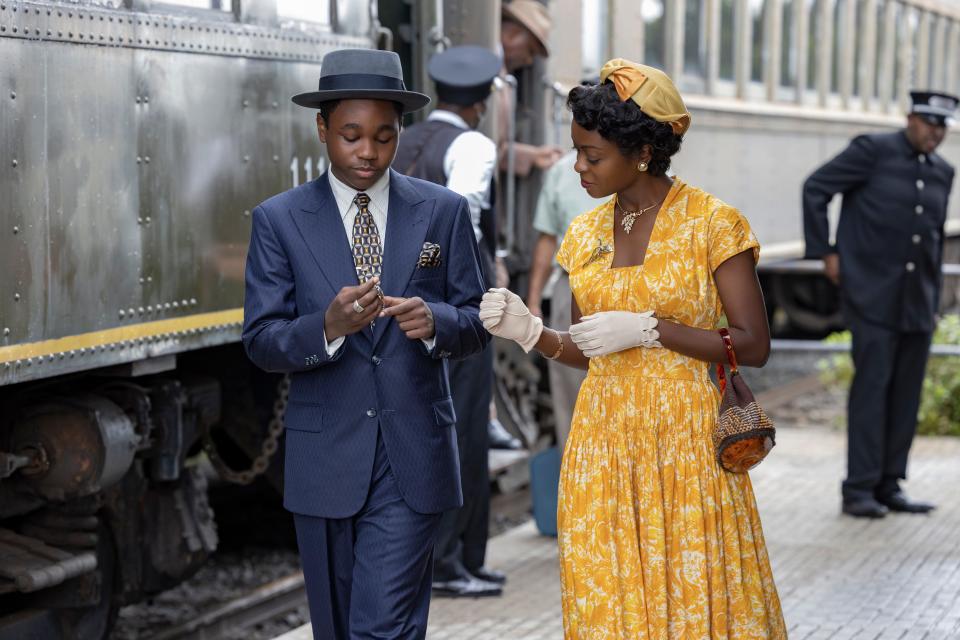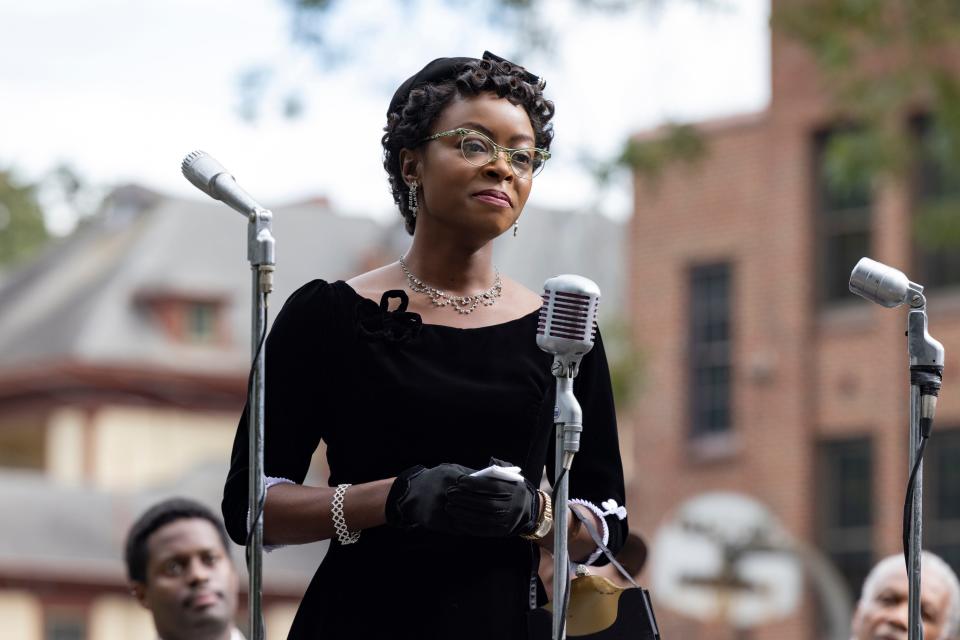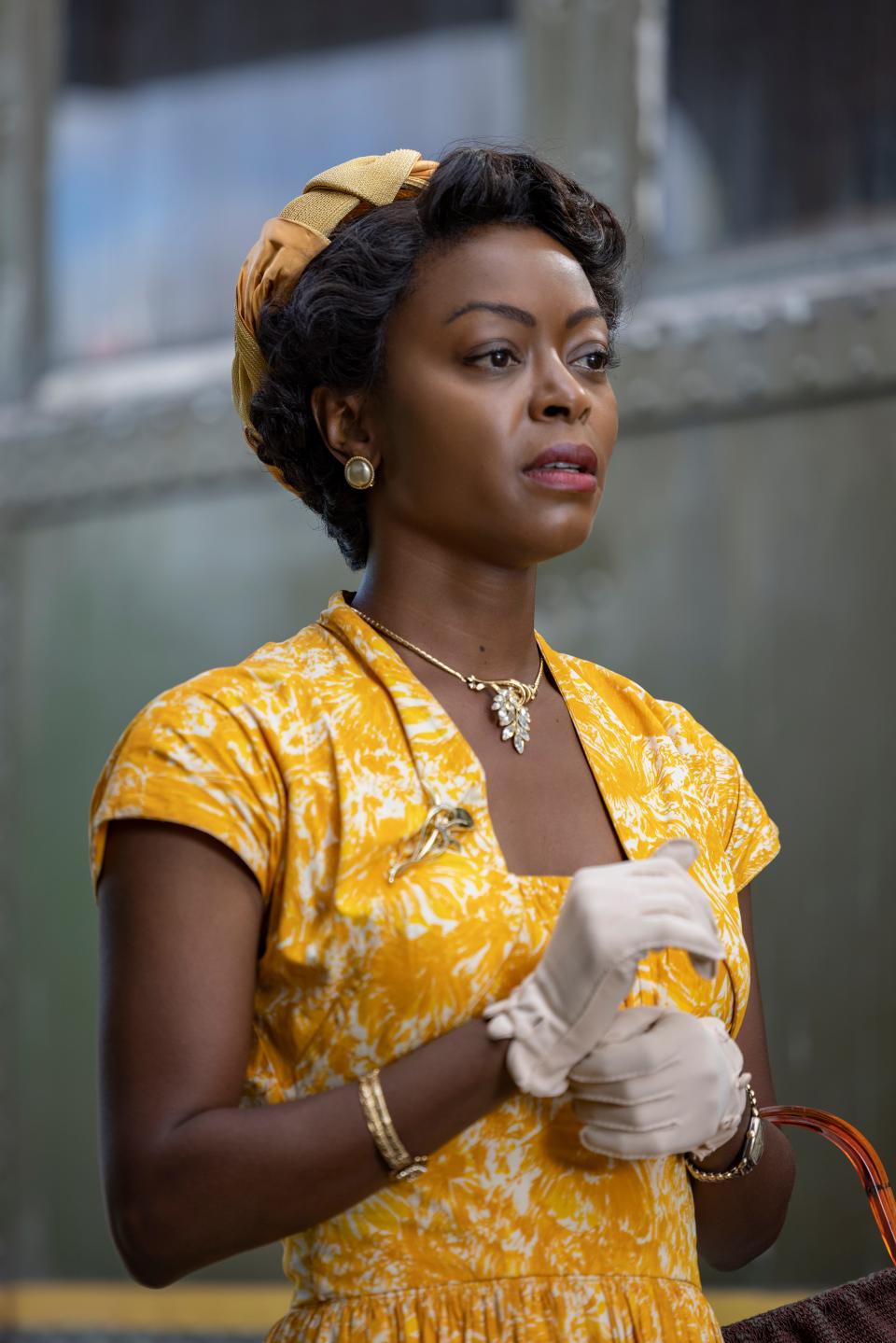Danielle Deadwyler cautions against skipping 'Till': 'Do you want to turn a blind eye to history?'
Danielle Deadwyler is exactly the force required to take on the role of Mamie Till-Mobley.
The 40-year-old actress portrays Emmett Till's mother in Chinonye Chukwu's new film "Till" (in select theaters Friday, nationwide Oct. 28), capturing Mamie's emotions before and after her 14-year-old son went from Chicago to Mississippi, where he was brutally lynched while visiting his cousins in 1955.
Deadwyler's performance has generated Oscar buzz, with The Wrap calling her portrayal "dynamic and transformative" and The Hollywood Reporter referring to her as a "powerful weapon" in the film's arsenal. Half of the Oscar experts at awards site GoldDerby predict she'll be nominated for best actress.
Deadwyler politely deflects when she was read a few of the adjectives that have been used to describe her performance.
"Any of that kind of talk is more valid to Mamie's legacy," she says. "It's fine. Awards are beautiful for a lot of different reasons, but more significantly, it's connected to (Mamie) wanting to continue to tell the story of Emmett. She didn't want to be the only one remembering him and at this point that's being actualized."

Grand jury declines to indict Carolyn Bryant: Accusation led to Emmett Till lynching
Deadwyler captured mainstream attention in the 2021 Netflix Western "The Harder They Fall," earning her an NAACP Image Award for her supporting role as Cuffee. Prior to that, she starred in the 2019 thriller "The Devil to Pay" and the 2018 period drama "Jane and Emma." Off camera, she got her start in theater and as a dancer.
The actress came across "Till" last year when her agent sent her the script. Deadwyler says she was "greatly hesitant in even reading it" because she had just moved to Los Angeles for a new project. "I had to take a long time to consider" whether to audition.
She has long connected with Mamie as someone raised in Atlanta and as a scholar focused on African American and women's studies at Spelman College and later Columbia University for her master's. "Everything I do is centered around Black women's stories," she says.
Mamie's legacy as a catalyst in the civil rights movement is also deeply personal for Deadwyler as a mother to 13-year-old son Ezra. For virtual auditions, Ezra stood in as Emmett before she met the film's star, Jalyn Hall. "(Ezra and I) have to have a conversation about what it means to be Black and how you have to navigate the world," she says. "Specifically, in dealing with white racism but (also) white supremacy."
"Till" has received criticism for piling on historical trauma for Black audiences still dealing with racism and injustices in society.
"It was hella uncomfortable watching the trailer for the Emmitt Till movie in a theater full of white people," Teen Vogue columnist Jenn M. Jackson tweeted. "Black pain, death, and trauma have to stop being the plot device."

'The Woman King': How Viola Davis' film highlights a less-depicted aspect of African storytelling
The movie doesn't focus on the heinous details of Emmett's murder by Roy Bryant and J.W. Milam and instead highlights Mamie's role in the fight for civil rights, Deadwyler says. "Very, very intentional, critical care has been implemented in making sure this film does not re-traumatize," she says.
The lynching of Emmett isn't depicted in the movie, although his cries are heard and his brutalized body – infamously captured in a Jet magazine photo – is shown.
To critics, Deadwyler asks: "Do you want to turn a blind eye to history in the way that certain people and systems and institutions want to turn a blind eye to our imprint on this country?"
"If you do not want to forget and if you do not want organizations, institutions (and) racist folks to mute or erase our presence or influence, (then it) is imperative that you continue to have the conversation," she says.
From texting suicide to child murder: Hollywood should stay away from some true crime
Deadwyler consulted with "Till" producer Keith Beauchamp, who was mentored by Mamie and directs the documentary "The Untold Story of Emmett Louis Till," to make sure Mamie's legacy was handled appropriately. She also "incessantly" referenced Mamie's autobiography "Death of Innocence: The Story of the Hate Crime That Changed America" "because those are her words."
Educating herself on Mamie's story while starring in "Till" is part of Deadwyler's insistence that audiences need to trudge through the discomfort of the subject matter to "know more and be a witness."
"In the same way that people did not want to look at Emmett, you're saying it again by saying you don't want to see (the film)," Deadwyler says. "With love, I ask you to be a witness."

'It can get exhausting': Yahya Abdul-Mateen II on Black trauma porn and importance of Black joy
The Emmett Till Legacy Foundation, which was founded by family members following Mamie's death in 2003, gave the film its blessing.
"We continue to fight for justice, we’re continuing to educate others, create awareness, and to make sure that Emmett’s death is not in vain," co-founder Deborah Watts said in a statement. "Our work is not done and it takes all of us to move forward to effect change in America. I believe the film 'Till' will have an opportunity to do that and to bring justice to others that have lost their lives in our country.”
The movie is "a part of the justice that they are seeking," Deadwyler says. "Not just in the realness of accountability for folks who did the things that have created a loss, but a personal accountability to ourselves to know what happened."
After the film showed at New York Film Festival, the actress met with Till's family and representatives of the foundation backstage. Emmett's first cousin once removed Teri Watts told her it was "inspiring" and reminded her that "the fight continues."
"If they're coming back from it and being more inspired to continue, it's not a place of sitting downtrodden. It's upliftment," Deadwyler says of "Till."
Review: How true-crime series 'A Friend of the Family' gets right what 'Dahmer' got wrong
This article originally appeared on USA TODAY: Danielle Deadwyler talks 'Till' Oscar buzz, Black trauma controversy
